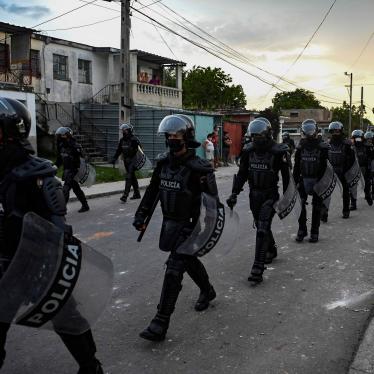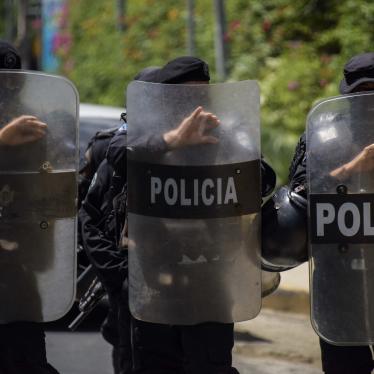Cuba’s trial and sentencing of a blind human rights lawyer and nine other dissidents violates their rights to freedom of expression, association and liberty, Human Rights Watch said today. Human Rights Watch called for their immediate and unconditional release.
The trial, which was held yesterday in the central Cuban city of Ciego de Ávila, was the country’s first major political prosecution since last year’s imprisonment of 75 dissidents. Among the defendants was Juan Carlos González Leiva, a blind lawyer who is the president of the Cuban Foundation for Human Rights (Fundación Cubana de Derechos Humanos).
Gonzalez Leiva was reportedly sentenced to four years of house arrest on charges of disrespect for authority, public disorder, disobedience and resisting arrest. Several of the other defendants, including Virgilio Mantilla Arango, reportedly received prison sentences of up to seven years. The prosecution was based on a political protest that they held at a provincial hospital in March 2002.
“The dissidents were convicted on the basis of their political beliefs and nonviolent political activities,” said José Miguel Vivanco, Executive Director of Human Rights Watch’s Americas division. “They should never have been put on trial.”
In addition to Gonzalez Leiva, the defendants included seven political activists (Lázaro Iglesias Estrada, Enrique García Morejón, Antonio Marcelino García Morejón, Delio Laureano Requejo Rodríguez, Virgilio Mantilla Arango, Odalmis Hernández Márquez, and Ana Peláez García) and an independent journalist (Carlos Brizuela Yera).
Another defendant, Léxter Téllez Castro, had been acting as an independent journalist but reportedly revealed at the trial that he had been working for Cuba’s state security police as “agent Ignacio.” In court, he reportedly renounced his work for the police.
Virgilio Mantilla Arango reportedly received a seven-year prison sentence, the longest sentence of all those handed down. The sentence included four years for his participation in the March 2002 protest and three years for his continuing antigovernment activities during his time in pretrial detention.
The other sentences are believed to be as follows: Enrique García Morejón received three and a half years in prison; Antonio Marcelino García Morejón received three and a half years in prison; Léxter Téllez Castro received three and a half years in prison; Lázaro Iglesias Estrada received three years in prison; Carlos Brizuela Yera received three years in prison; and Delio Laureano Requejo Rodríguez received two and a half years in prison but was released from custody. The two women defendants, Odalmis Hernández Márquez, and Ana Peláez García, were sentenced to three years of house arrest.
The defendants were arrested on March 4, 2002, at a provincial hospital in Ciego de Ávila when they visited an independent journalist who had reportedly been attacked by the police earlier in the day. At the hospital, members of the group shouted statements such as “Long live human rights” and sat on the floor. Reacting with disproportionate severity to this minor disruption, state security police arrested the group and held a number of the defendants in pretrial detention for more than two years.
The denial of basic civil and political rights is written into Cuban law. A number of criminal law provisions grant the state extraordinary power to prosecute people who attempt to exercise basic rights to free expression, opinion, association, and assembly. The country’s courts also deny defendants internationally-recognized due process guarantees, including the right to a public hearing by an independent and impartial tribunal.
In mid-April, the U.N. Commission on Human Rights in Geneva passed a resolution criticizing Cuba’s human rights practices. The resolution stated that the Commission “deplores the events which occurred last year in Cuba,” a reference to the trials and sentencing of 75 dissidents.
“The trial and conviction of these 10 dissidents show that political activists, independent journalists, and human rights defenders continue to be unjustly punished in Cuba,” Vivanco said.






